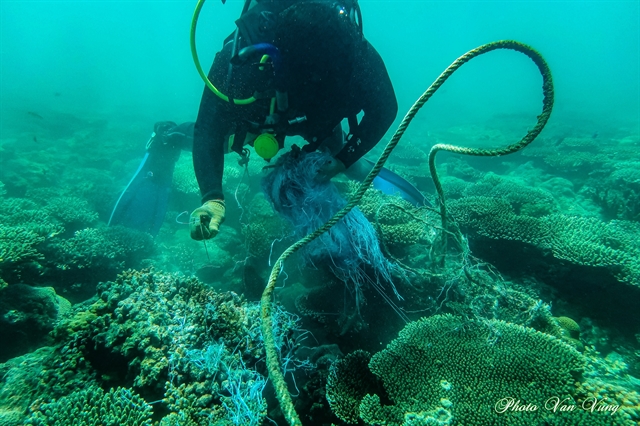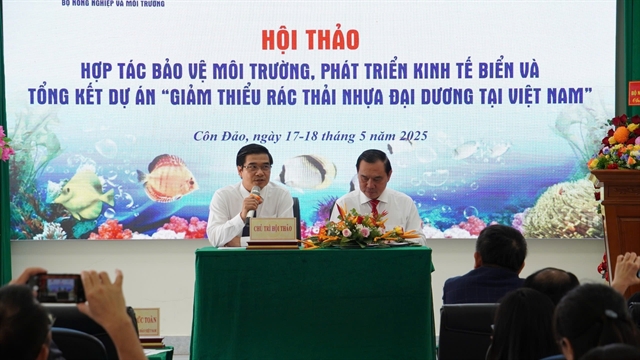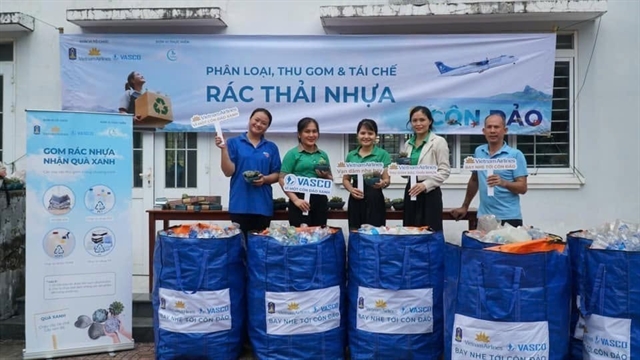 Environment
Environment

 |
| Personnel from the Côn Đảo National Park Management Board regularly carry out underwater clean-ups of coral reefs. — VNA/VNS Photo Huỳnh Sơn |
BÀ RỊA-VŨNG TÀU — The dual goals of protecting the marine environment and promoting sustainable ocean-based economic growth have been highlighted at a recent workshop held in Côn Đảo Island in Bà Rịa–Vũng Tàu Province.
Given the escalating crisis of marine plastic pollution, the event themed “Cooperation for environmental protection, marine economy development, and final review of the ocean plastic waste reduction project in Việt Nam” served as a platform for stakeholders to assess current challenges, share experiences, and propose practical solutions.
It was jointly organised by the Environmental Education Centre of Côn Đảo National Park, Ministry of Agriculture and Environment, in collaboration with the World Wide Fund for Nature (WWF) and the Provincial People’s Committee.
Việt Nam is among the countries most affected by ocean plastic pollution, heard the two-day event.
Studies show that plastic waste in the ocean severely disrupts ecosystems, diminishes fishery resources, and negatively impacts human health.
In response, the Vietnamese Government has implemented various initiatives, including a national action plan on ocean plastic waste management through 2030.
Speaking at the workshop, Nguyễn Đức Toàn, director general of the Vietnam Administration of Seas and Islands, said the rich biodiversity of Việt Nam’s island ecosystems, including coral reefs, seagrass beds, and mangroves, play vital roles in maintaining fisheries, absorbing greenhouse gases, and mitigating climate change.
However, limited integration between island and mainland development has hindered the potential of the blue economy.
“Marine pollution, especially from plastic, is one of the biggest threats to ocean health. Floating plastic waste in many island regions has reached alarming levels, affecting tourism, aquaculture, and local livelihoods,” he said.
Participants at the workshop discussed key topics such as the sustainable development of island districts in line with environmental and national security goals, the strategic role of island communities in safeguarding national sovereignty, and successful local models for marine protection.
 |
| A discussion session at the workshop held in Côn Đảo Island in Bà Rịa–Vũng Tàu Province from May 17 to 18. — VNA/VNS Photo Huỳnh Sơn |
Marianne Henkel, head of the Asia Programme at WWF-Germany, said through the 'Plastic Smart Cities’ initiative, various reduce-reuse-recycle models have been adopted by local communities.
“More than 18,000 local households have been trained in waste separation at source, laying the foundation for sustainable practices,” she said.
In marine protected areas, more than 10,600cu.m of plastic waste have been collected, 3,500 of which came directly from the ocean.
Thousands of fishermen and over 1,000 crew members have pledged to bring waste back to shore rather than discard it at sea.
Behaviour-changing campaigns have also had an impact, with the proportion of residents refusing single-use plastics rising from 47 to 97 per cent, and behavioural progress scores improving from 45 to nearly 60 points - clear signs of meaningful transformation.
WWF-Germany remains strongly committed to supporting Việt Nam in protecting marine ecosystems and fostering a sustainable blue economy.
“We are ready to scale up successful models and help connect the country with global and regional environmental networks,” she said.
Hồ Thị Nguyên Thảo, vice chairwoman of Phú Yên Province People's Committee, said the project in her locality has been effectively implemented, thanks to strong collaboration between local authorities and coastal communities.
“The effort has helped reduce pollution and strengthen plastic waste management,” she said.
The project not only supports infrastructure improvements and pilot initiatives, but also facilitates collaboration among stakeholders, fostering collective action to address plastic pollution and improve environmental outcomes in Phú Yên, she added.
 |
| Programme for waste collection and sorting at source in Côn Đảo Island. — VNA/VNS Photo Huỳnh Sơn |
Trần Thanh Huyền, vice chairman of Côn Đảo District people's Committee, said the local government, with project support, launched a plastic waste reduction action plan for the 2022–25 period aimed at eliminating plastic waste in the marine reserve and positioning Côn Đảo as a leading island district in tackling marine plastic pollution.
"Côn Đảo aims to cut plastic waste leakage by 30 per cent compared to 2020 levels."
Over the past three years, numerous actions have been taken with notable results.
These include expanding ‘green house’ models, converting old banners into reusable bags, implementing plastic-reduction initiatives in schools, composting organic waste, and promoting plastic-free tourism and cemeteries.
Workshop discussions also reaffirmed the strategic importance of islands in economic development, environmental protection, and national security, as outlined in Resolution 139/QH15 on national marine spatial planning for the period of 2021-2030 with a vision towards 2050.
Participants acknowledged challenges such as pollution, weak economic integration, and climate change; and proposed solutions included developing a circular economy, eco-tourism, and sustainable aquaculture.
The workshop also called for enhanced inter-island and island-mainland cooperation through economic value chains, public-private partnerships, and technology applications in resource management.
Notably, initiatives on biodiversity conservation, plastic waste management, and public awareness have gained wide support, reflecting a strong commitment to turning the country’s islands into models of green and sustainable development. — VNS




